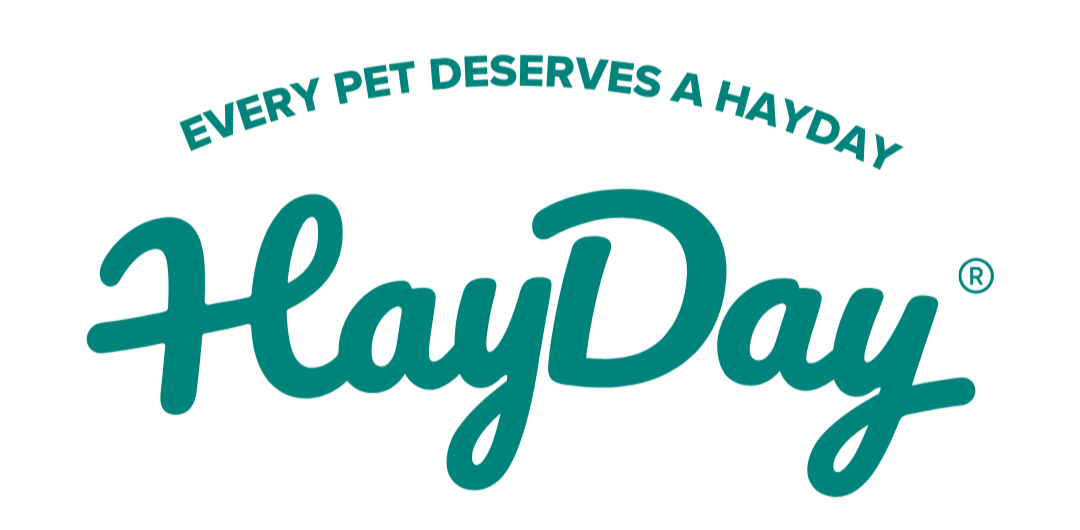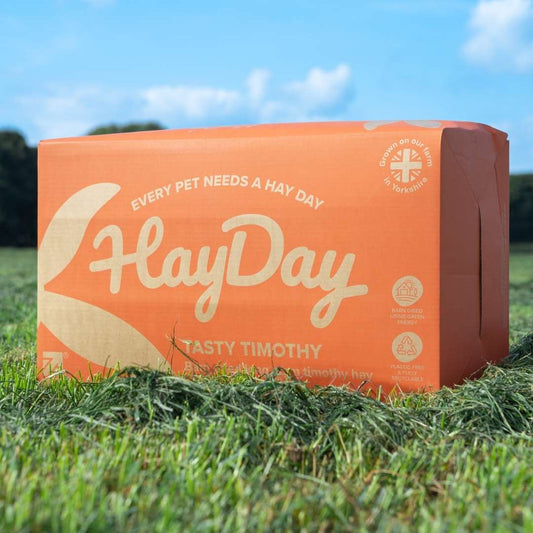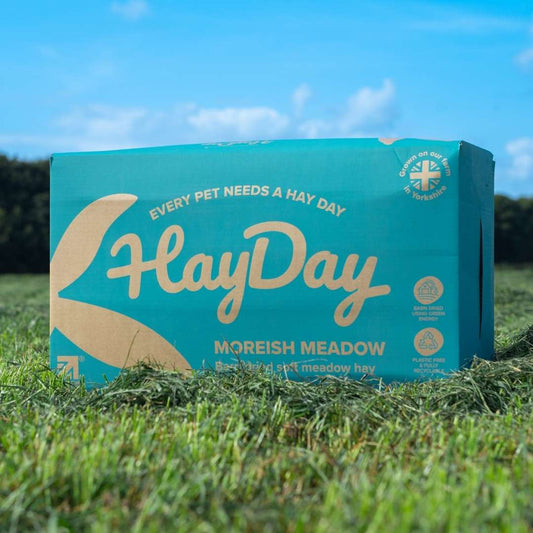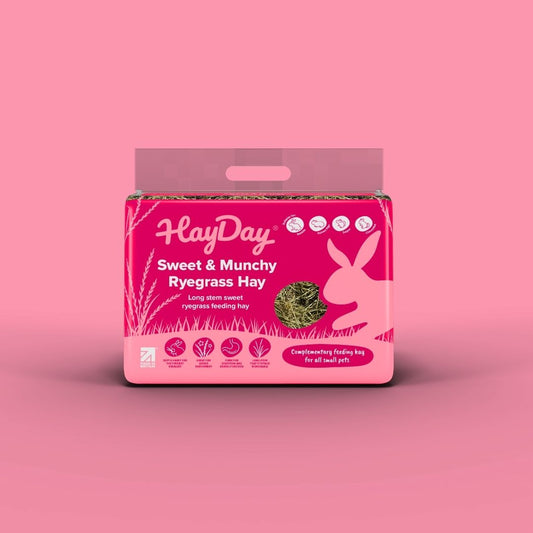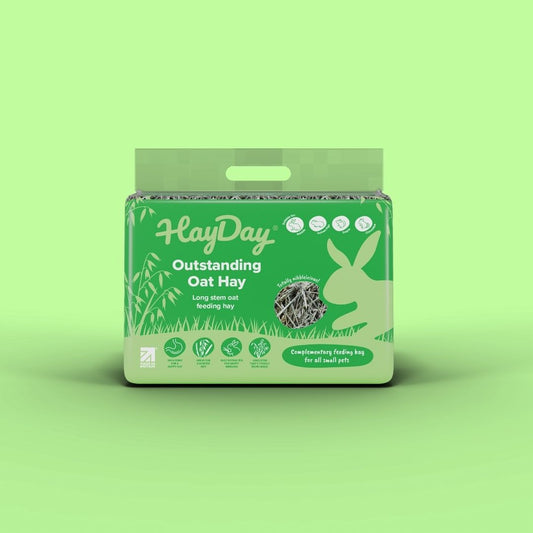What is the recommended way to feed my rabbit in order to support their health?
This expert guide from HayDay explains everything you need to know about feeding rabbits, including the importance of a balanced diet which includes hay, fresh vegetables, and controlled food intake.
Let's discover how to keep your rabbit happy and healthy with a balanced diet.
Shop Now > Premium-quality, beautifully green and expertly grown hay boxes for rabbits.
Key Takeaways
-
Hay should make up approximately 80 to 85% of a rabbit’s diet, providing essential fibre and nutrients for digestive and dental health.
-
Fresh vegetables and limited pellets are important for balanced nutrition, while fruits should only be given as occasional treats.
-
Monitoring your rabbit’s eating habits and adjusting their diet for any special dietary requirements are crucial for maintaining their health.
The Importance of Hay in a Rabbit's Diet
When it comes to a rabbit’s diet, feeding premium-quality hay serves to be extremely important. It should constitute around 80% to 85% of your rabbit’s daily intake, providing essential nutrients and fibre for their overall health. Refer to our feeding guidelines for further feeding recommendations.
Hay is crucial for maintaining a rabbit’s digestive system, ensuring it functions correctly and efficiently. Boasting high fibre content, hay helps keep their digestive system in check and helps prevent various health issues - including GI Stasis.
Without adequate hay, rabbits can develop painful dental conditions known as ‘spurs’, which can severely interfere with their ability to eat. Insufficient hay consumption can indeed lead to serious dental diseases, as long stem hay helps to wear down their ever-growing teeth.
Selecting the right type of hay is also essential. Suitable varieties for adult rabbits include Timothy Hay and Meadow Hay, with Ryegrass Hay and Alfalfa Hay being suitable in moderation. Young rabbits under 6 months can benefit most from Alfalfa Hay, which supports their growth and development due to the high calcium and protein content. Remember, adult rabbits require mainly grass hay, such as Timothy Hay or Meadow Hay, which offers high fibre and protein content.
Good quality hay isn’t just a feeding choice but a necessity for your rabbit’s health. Regularly replenishing and ensuring the hay’s freshness will keep your rabbit happy, healthy and enriched.
Tips For Using a Hay Feeder or Rack
Using a hay rack or feeders for hay is an excellent way to keep your bunny's forage clean, fresh, and easily accessible - not to mention it makes for great enrichment! Here are some essential tips to ensure you're using your rabbit feeder effectively.
Choose the Right Feeder
-
Size: Select a feeder that is large enough to hold a sufficient amount of hay without causing overflow or becoming too compacted.
-
Material: Opt for feeders made from durable materials like wood. These materials are not only long-lasting but also easy to clean.
-
Type: Choose a feeder style that best suits your rabbit's needs. Hanging racks or floor feeders are popular options, each offering unique benefits depending on your rabbit's feeding habits and their setup.

Filling Hay Racks and Maintenance
-
Fill Daily: Make it a routine to refill the feeder daily (and frequently throughout the day) with fresh hay. This ensures that your rabbit has access to clean and nutritious hay at all times.
-
Clean Regularly: Regular cleaning is crucial to prevent mould and bacteria. Use warm water or white vinegar to clean the feeder thoroughly, ensuring it is dried thoroughly before refilling.
-
Consider Weather: If your rabbit lives outdoors, protect the feeder from elements like rain to keep the hay dry and in good condition.
Proper Placement
Where you place the feeder in your rabbit's environment can make a big difference in their ability to access hay comfortably.
Ensure the feeder is positioned at a height and location where your rabbit can easily reach it without causing any strain.
To maintain hygiene, avoid placing the feeder near the litter box or other areas where waste accumulates, as this can contaminate the hay and create an unhealthy eating environment.
Read more: How to litter train a rabbit tips
Hay Quality
Finally, always prioritise the quality of the hay you provide. High-quality and dust extracted hay, such as Timothy Hay, Meadow Hay or Ryegrass Hay, is essential for your rabbit’s health and digestion. To keep your rabbit's diet varied and interesting, consider feeding different types of hay.
This not only makes mealtime more enjoyable by offering different tastes and textures, but also encourages your rabbit to eat more.
By following these tips, you can ensure your rabbit has a clean, convenient, and nutritious supply of hay, contributing to their overall wellbeing.

Fresh Vegetables and Greens
Fresh vegetables and leafy greens also play an important role in a rabbit’s diet.
Between (approximately) 5% to 10% of your rabbit’s diet can consist of these fresh foods, providing essential vitamins and minerals that support their overall health.
Celery, collard greens, green peppers, radish tops, broccoli, carrots, and mustard greens are beneficial for rabbits. Always wash any veggies thoroughly before feeding them to your rabbit to remove any potential pesticides or contaminants.
Iceberg lettuce, despite being a common leafy green, should be avoided as it lacks nutritional value and can be harmful to rabbits.
A varied diet that includes fresh food, leafy green vegetables, and herbs ensures your rabbit gets a balanced intake of nutrients. Always introduce new foods slowly, over a period of 7 to 14 days and monitor your rabbit’s reaction to avoid potential health issues.
Limited Pellets for Balanced Nutrition
Pellets should be included within your rabbit’s diet, but they should only make up a small portion. Overfeeding pellets can lead to obesity and other associated health problems in rabbits.
Supplement your rabbit’s hay and fresh vegetables with a small amount of rabbit pellets (approximately an egg-cup full) or nuggets to maintain a balanced diet.
Moderation is key, so offer pellets in controlled, small quantities.
Safe Fruits as Occasional Treats
Fruits make delightful treats for rabbits but should be given sparingly. Safe fruits include apples (without seeds), bananas, blueberries, and strawberries. These fresh foods are tasty rewards but should be limited to prevent health issues from high sugar intake.
Remove pits and seeds from fruits as they can be toxic to rabbits.
Consider fruits as occasional treats rather than a regular part of the diet. Limiting fruit intake to once or twice per week helps keep your rabbit’s diet balanced and healthy.
Foods to Avoid
Knowing which foods to avoid is as important as knowing what to include in your rabbit’s diet. Certain plants like raw rhubarb and avocado are toxic and should never be fed to rabbits.
Foods like chocolate and yoghurt are poisonous and can lead to serious health issues.
Muesli-style food, despite being readily available, should not be part of a rabbit’s diet due to its poor nutritional profile.
Ensuring Fresh Drinking Water
Fresh water is crucial for a rabbit’s overall health and proper digestion. They should have unlimited access to water, at free choice.
During warmer weather, check water bowls daily for algae growth and ensure to keep them clean and algae-free. For outdoor rabbits during winter, always ensure that their water hasn't frozen over - you can use heat pads to help prevent this.
Encouraging Natural Foraging Behaviors
Encouraging natural foraging behaviors aligns with rabbits’ instinctual eating habits and combats boredom.
By feeding hay, it allows rabbits to engage in foraging behaviors, which they'd natural produce in the wild, that keep them mentally and physically stimulated. Promoting these natural behaviours helps prevent health issues like obesity and overgrown teeth, ensuring a happier and healthier pet rabbit - and one which is enriched.
Scattering food and hiding treats around their set-up (such as within their hay) stimulates natural instincts and keeps them mentally engaged. Foraging for food also helps rabbits eat at a slower pace, preventing obesity and promoting a healthier lifestyle.
Keeping rabbits in pairs or groups encourages natural foraging behaviors by reducing stress.
Monitoring Your Rabbit's Eating Habits
Closely monitoring your rabbit’s eating and drinking habits is vital for their health. Daily observation can detect changes that may indicate serious health issues. A lack of food intake or reduction in droppings should prompt a visit to the vet.
Dental disease, a common issue in rabbits, can cause discomfort when chewing, making them less likely to eat hay or grass. If your rabbit is reluctant to eat hay, consult a vet to check for any dental or digestive issues.
Adjusting Diet for Special Needs
Rabbits with special dietary needs, like those that are pregnant, nursing, or underweight, require tailored feeding plans.
Pregnant and nursing rabbits need increased food portions to support their energy needs and the growth of their young. Alfalfa Hay is an excellent forage choice for pregnant or nursing bunnies.
If in doubt, a veterinarian can help consult on balanced diet that meets the specific needs of your rabbits.
Remember - each rabbit is unique so it is essential to provide a diet tailored to their health and condition.
Summary
Feeding your rabbit a balanced diet is crucial for their overall health and wellbeing.
From providing green, premium quality and dust extracted hay, rabbit-safe pellets and fresh vegetables to monitoring their eating habits and adjusting their diet for special needs - every aspect plays a vital role in ensuring a happy and healthy rabbit.
By following these tips and consulting with a veterinarian when necessary, you can create a feeding plan that supports your rabbit’s health throughout their life. Remember, a healthy diet leads to a happy rabbit.
Relevant Links
How to Encourage Rabbits to Forage
Rabbit Welfare Association and Fund - Convert a Garden Shed
Rabbit Welfare Association and Fund - Housing Advice
Frequently Asked Questions
What type of hay is best for young rabbits?
The best hay for young rabbits under 6 months old is Alfalfa Hay, as it provides essential nutrients (such as high calcium and protein) for their growth and development.
How often should I replenish my rabbit's hay supply?
You should regularly check your rabbit's hay and replenish it with fresh hay daily. Rabbits, and other small animals, should have unlimited access to hay and at free choice.
Can I give my rabbit fruits every day?
You should only give your rabbit fruits as occasional treats, ideally once or twice a week, due to their high sugar content.
Why is it important to monitor my rabbit's eating habits?
It's crucial to monitor your rabbit's eating habits as it can reveal early signs of health issues like dental disease or digestive problems.
By keeping a close eye on their food intake can ensures timely intervention by a vet.
How can I encourage my rabbit to forage naturally?
Encouraging your rabbit to forage naturally is best achieved by feeding a variety of different hays and scattering this throughout their living space. This will encourage your rabbit to 'work' for their food, increase movement and keep them mentally stimulated.
